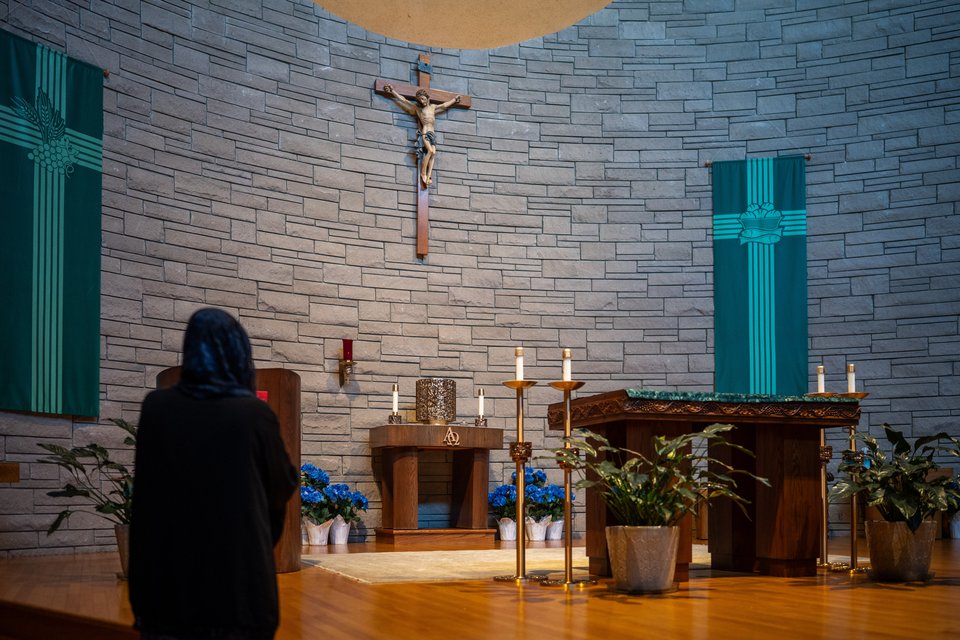17 priests with a combined 901 years of service enjoy fellowship, constant access to the Eucharist in Livonia senior community
LIVONIA — For nearly 34 years, nestled in the Felician Sisters' vast campus in Livonia, the Senior Clergy Village has provided a quiet, peaceful place for the Archdiocese of Detroit’s senior priests to spend their retirement days.
Set back from the road and surrounded by nature, the 20 single-level apartment units form a half circle around the community building, which, at its center, hosts a small chapel with the Eucharist always present.
Since its creation in 1992, the village has been home to dozens of retired priests ages 70 and older, and can house up to 20 priests at a time, with one priest per 860-square-foot apartment, Carol Ann Fausone, president of the Senior Clergy Village, told Detroit Catholic. Currently, the village is home to 17 priests with a combined 901 years of service.
Fausone said each priest has his own single-level apartment with an attached garage. Maintenance and housekeeping are provided, and a community dinner is served five days a week. Over the last several years, apartments have been renovated with granite counters, walk-in showers and vinyl wood floors.
Mass is offered every morning, and the brother priests routinely convene in the community center to say Vespers and read Scripture. They also gather for a happy hour on Tuesday evenings once a week.


“What I really like about (the village) is that there is a lovely blend of individuality and community,” Fr. Richard Leliaert told Detroit Catholic. “You have your own apartments and your privacy, but you are never alone — that’s kind of a nice thing because I like both.”
Fr. Leliaert spends his alone time doing photography and riding his bike around the property, but he said he enjoys sharing community with his brother priests.
“I’ve often wondered what it would be like to be out somewhere in an apartment by yourself and then contrast that with what we have here, and that’s a blessing,” Fr. Leliaert said. “There are all these little things that you don’t think of as blessings: meals five days a week, your needs are taken care of, the opportunity to be close to God — we have the Eucharist here — it’s just a gift, and I think about that a lot, how lucky I am.”
In order to qualify as residents, Fausone said that priests must be senior in good standing, at least 70 years old and ultimately referred at the discretion of the archbishop and the archdiocese's vicar for clergy.
Fausone said the village is “one of a kind,” and she routinely gets calls from dioceses across the country to consult on how to better care for their aging, retired priests.
Fausone said she, the staff – which, in addition to Fausone, includes Sr. Beatrice Marie Plamodon, the village's hospitality coordinator, Karen Richter, administrator, and Richard Fullmerhouser, hospitality associate – and the Felician sisters next door, do all they can to provide a comfortable, caring environment. Healthcare workers make home visits to the village, and thanks to a grant Fausone applied for and received earlier this year, more volunteers will be available to help run errands for groceries, medication, or other needs, not only for the residents of the village but for all retired archdiocesan priests.
“We take care of 20 priests, but sometimes we are taking care of all 82 (senior priests),” Fausone said. “They will call, and our resident senior priests will tell other senior priests out there about us.”
The priests are always looking out for one another, Fausone added.



“There is that comradery, and what I like from my military days is you are taking care of your buddy,” Fausone said. “So your brother lives next door to you, and if you don’t see your brother, the priests can come to one of us and say, ‘Hey, we haven’t seen this priest in a while,’ and we can make sure that priest is OK. That’s something that doesn’t happen when you are out living by yourself.”
Msgr. John Kaul, 77, a Detroit priest who retired from the Archdiocese for the Military Services in Washington, D.C., moved into the village in 2017 after 49 years in ministry. Msgr. Kaul routinely tells his priest friends across the country about the village, which opened under Cardinal Adam J. Maida, who made caring for the archdiocese's senior priests a priority, he added.
“Because of my Navy background, I know priests in every one of the major dioceses in the country, and when I tell them about this place, they don’t believe me,” Msgr. Kaul told Detroit Catholic. “(Few) of the other dioceses set out to take care of their retirees the way Detroit did years and years ago. The Navy guys I talk to feel set adrift — ‘Here’s your pay, your allowance. Go off, you are on your own.’ Detroit had another idea.”
The village provides much-needed fraternity, Msgr. Kaul added.
“Many of the guys retiring just get lost” out on their own, Msgr. Kaul said. “Priests, the successful ones, seem to be able to maintain relationships with brother priests.”
Even more important than the fraternity provided by the Senior Clergy Village, however, is the abiding presence of the Eucharist at its center, reserved in the chapel in the middle of the campus.
“We've got our own chapel in the middle of our own community,” Msgr. Kaul said. “The guys who aren’t here don’t have that. They have to go looking for it; they have to find a key, and they have to get into a church. But the Eucharist is literally geographically in the center of this place — the way everything is built around it — and it is awesome.”
Copy Permalink
Senior living Priesthood












